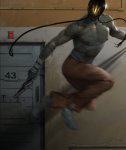Rick Wayne's Blog, page 17
July 22, 2020
(Curiosity) The Real Threat of Deepfakes
This is a video of President Nixon giving a speech he never made. The speech itself is real. It was prepared in advance of the 1969 moon landing should something go wrong. The MIT Center for Advanced Virtuality created the clip and accompanying website to highlight the dangers of disinformation.
From Space.com:
The 7-minute video begins with real Apollo 11 footage, which team members edited deceptively to create the impression that the epic moon landing failed. Then comes Nixon’s speech. It was actually read by a voice actor, but you’d never know it. The team used deep-learning and artificial-intelligence tech to reproduce Nixon’s voice and facial movements.
“This alternative history shows how new technologies can obfuscate the truth around us, encouraging our audience to think carefully about the media they encounter daily,” project co-leader Francesca Panetta, XR Creative Director at MIT Virtuality, said in a statement.
“In Case of Moon Disaster” debuted last year as an art installation, which featured a reproduction of a 1960s-era living room. The project has been selected by several film festivals, and it received a Creative Media Award from the Mozilla Foundation.
“It’s our hope that this project will encourage the public to understand that manipulated media plays a significant role in our media landscape, and that with further understanding and diligence we can all reduce the likelihood of being unduly influenced by it,” project co-leader Halsey Burgund said in the same statement.
You can learn more about the project at http://moondisaster.org.
It’s hard to have a nuanced discussion about this technology. Projects like this have a novelty that is hard to separate from rational appreciation of its downstream effects. There’s a real sense in which this video is just cool, regardless of the rest.
Deepfake tech will revolutionize entertainment, particularly pornography, which will sell videos of actresses and other public figures getting fucked in the ass, among other things. It will dramatically expand the possibilities of satire — one can see Saturday Night Live using it — but of course libel and slander as well. It also raises ethical issues about using people’s likenesses without their permission, especially when they’re dead.
But I’m not sure it will be routinely used to mislead large numbers of people or feature prominently in national-scale propaganda anywhere except countries like China. And while that is a real threat, the problem is China’s political system, which retains a monopoly on narrative, and its use of technology broadly.
For one, while deepfakes can fool the human eye (and ear), they retain signs that they’re deepfakes. Even before we get to a detailed pixel analysis, there are the obvious questions like “Where did this video come from?” In the case of the moon landing disaster, such a video would had to have been stored on some kind of legacy media, which, if it were real, we should be able to examine.
We also have to be careful about predicting the future by drawing a straight line from the present. In the West, where narratives are hyper-competitive, large lies will be subject to scrutiny. And in fact, as these technologies proliferate, I expect people will become increasingly skeptical about fantastic claims, at least about anything they don’t already want to believe.
The MIT ended with a call to “Check Your Sources.” While that’s always good advice, it also seems surprisingly naive. It suggests this technology poses a direct threat, where bad actors will circulate standalone lies like this, which can be defeated with a little fact checking.
In such cases, the cost-benefit of the higher cognitive burden of critical evaluation is clearly positive. There is a net benefit to taking the time to critically analyze a video of a US president or other world leader. (Some people will be fooled, but some people are already fooled.)
In truth, this technology’s most pernicious effects will be felt locally, in places where motives are obscure and the cost-benefit of engaging in critical analysis is low, either because the benefit is low or the cost on the bearer is high (or both).
It will be used for all kinds of trolling behaviors, for example, like convincing a teen that her girlfriend is cheating or suggesting to the boss that you badmouthed him at the bar or getting the neighbor in trouble with law enforcement — situations where it’s not clear someone would bother to create a fake.
Political parties and intelligence services will also use deepfake tech of course, but nothing as ham-fisted as this. They have big budgets and will use it with sophistication and laser focus, creating small lies that link two real, verifiable but unrelated facts as part of a larger narrative warfare campaign, fed by big data, much of which will actually be true but which collectively creates a false version of reality.
The cognitive burden of parsing that campaign, which will never be obvious as a campaign, will be extremely high. Given that we won’t know what is fake and what is real, we will have to test all of it, which is costly and time consuming, leaving us victims of an enormous asymmetry. Corporations and governments have those resources ready to hand. Ordinary people do not.
In all these examples, “checking your sources” is either technically infeasible or hardly matters: there will be nothing you can do to prevent a pedophile from creating an X-rated video of your 11-year-old daughter, scraped from an innocent vacation video or surreptitious footage at the park.
July 21, 2020
(Art) The Synthetic Sisters of Michael Black
[image error]
Digital artist Michael Black’s renders feature an insane amount of detail. Be sure to click on these to enlarge, and to visit Mr. Black’s ArtStation page.








July 20, 2020
(Fiction) Sacrifices
[image error]
“I hate being in the city.” Nio made a beeline for the coffee stand, which had a short line. “Why can’t we stay somewhere else?”
Quinn followed. “Not feeling any better, I see.”
“Meaning?”
“Nothing, it’s just you were in a bit of a mood when we got in last night.”
“This shackle is a pain.” She knelt to scratch under it, but the device was too tight.
“You’re lucky you don’t have one of the old ones. They weren’t waterproof. You would’ve had to put your foot in a plastic bag and close it with a rubber band.”
“How long is this meeting supposed to take?”
“With Erving? Probably not long. He’s a busy man. But we’re also set to coordinate with Agents Willis and Cortines, who originally investigated the case. We were supposed to have a teleconference with them a couple days ago in—”
“In Minneapolis. Yes, you’ve mentioned Minneapolis. Several times.”
“Okay.”
Nio ordered a coffee and donut from the teenager behind the counter and stepped to the side.
“Nothing for me,” Quinn said with a smile. He watched Nio eat the donut in three large bites. “You wanna tell me what’s wrong?” he asked.
“Nothing,” she said with her mouth full.
“Nothing . . . Okay. For the record, the only woman who gets to play the Guessing Game with me is my wife.”
“Whatever.”
The barista leaned over the counter. “Here’s your coffee.”
Nio left the lid on the counter and walked out the front, blowing on the hot liquid. The sliding doors parted for her and a man walked past wearing bright red shoes. Nio turned to look just as gunshot broke and the glass of the door shattered. She ducked and spilled her coffee over the sidewalk as screams erupted all around.
“STAY DOWN!” Quinn pulled his sidearm and ran in a crouch toward the sound of the shot.
Traffic screeched to a halt in the immediate vicinity and several drivers left their car doors open and joined pedestrians hiding behind poles and mailboxes. Vehicles that hadn’t been immediately nearby or whose drivers hadn’t heard the shot continued to weave into the fray only to get trapped by the chaos. Several tried to escape by accelerating, and there was a collision almost directly in front of Agent Quinn, who spotted an open window on the fourth floor of a building across the from the hotel complex.
“Miss, are you okay?” the concierge asked Nio, helping her off the ground. “We should get inside,” he said urgently.
Nio was facing the shattered door, looking for the man in red shoes.
“There was no bullet,” she said.
“What?”
With no reflection to warn her, she didn’t see the revving silver sedan until it was nearly on her. She pushed the concierge and dove into a brick-lined garden display. The car smashed up over the little wall, nearly crushing her, before impacting the frame of the door. Glass fell.
And then it stopped. A tire spun over her.
The silence of confusion was broken only by the screaming of a child in the back seat of the sedan.
A child!
Nio crawled out from under the angled vehicle just in time to see the driver, a middle-aged woman in a flower-print blouse and glasses, drop to the brick sidewalk. Her eyes were wild as she fell on top of Nio.
“What’s the matter, Ms. Tesla?” she said. “Don’t you want to play with me?” Her eyes burned.
Nio knew she wasn’t supposed to believe the driver was Mr. Misery. She was supposed to believe he was controlling the woman somehow.
“There’s no such thing as mind control,” she accused.
And yet, the woman’s bioelectrics were all wrong. Despite her panicked outward appearance, despite the screaming child in the back of the car, the woman on top of Nio had no frenzied cycling. Her pattern signaled concentration. Intent.
Quinn leapt over the car and pulled her off. He raised a heavy fist and but stopped as if just realizing she was female.
“Wait! Please! He was going to hurt us!”
“Who?”
“The voice on the radio. We were driving to Samuel’s daycare. I was getting caught up on email when the car announced it was recalculating the route. I couldn’t take control. There was a voice, a deep voice on the radio. It gave me very precise instructions, but I can’t do it. I just can’t. Please, please help my son!”
Nio darted to the car and removed the toddler, who was barely old enough to walk and wailing at the top of his lungs.
“What were you supposed to do?” Quinn asked.
She handed the child to the terrified woman, who was still on the ground. Her embrace did nothing to calm her son. In fact, the boy was squirming to get away.
“I was supposed to act like he had taken over my mind. I was supposed to tell you things. He said as long as I—I wasn’t violent, that you’d—”
“What were you supposed to say?” Nio interrupted.
The woman looked between them. He settled on Quinn. “You must be Agent Quinn. I was supposed to tell you that your wife’s hydrangeas are coming in nicely.”
Quinn and Nio turned to each other.
“Khora . . .” He breathed. He replaced his weapon and went for his phone.
Sirens were already approaching.
“Am I in trouble?” the woman on the ground asked. “I didn’t want to do it! I was just protecting—”
“Stay there,” Nio said.
“Honey!” Quinn said to the phone. “Are you okay? Is everything okay?” A pause. “Where’s Gregory?” Pause. “Please check on him. Yes, right now.” Pause. “No, it’s fine. Everything’s fine. Just please go check.” He covered the microphone and turned to Nio. “I need to get the Bureau over there.”
“Don’t let your people go in,” she said.
“What if he did something—”
“Your family’s been there and nothing has happened! The FBI barging in might be the trigger. Have them leave, calmly. Tell them not to get into the car, just walk calmly down the street.”
“There’s a small park a couple blocks away.”
“That’s good. Have them go for a nice early morning walk. Your people can pick them up at the park. Just get them out of—”
“Right,” Quinn said to his wife. “That’s great. Honey, listen to me. I need you to take Greg and go for a little walk. Don’t get your coat. Don’t get anything. Don’t lock the door, just go. Right now. Take him and walk calmly to the park down the street. No, it’s fine. It’s just a precaution. Just take Greg and go. Don’t argue with me, please!” A moment later, he lowered the phone. “Okay, they’re going.”
He took out his ID and held it high for the approaching police officers. Then he replaced the phone to his ear.
“Honey, listen to me. Just go to the park. I’ll call you right back. No, no. I just need to make sure everybody’s on their way. Okay? I’ll call you right back.”
Quinn asked the cops to get a statement from the woman on the ground, who was clinging to her son and trying to calm him as the boy repeatedly flailed and went limp.
“And search that building!” He pointed. “We may have a shooter.”
A third patrol car arrived and Quinn stepped to it.
“I need to get to Federal Plaza!”
After a very short call with Special Agent Erving in the car, who felt certain the shot was a diversion to leave Nio exposed, Quinn was back on the phone with his wife, who had almost reached the little park around the corner from their house.
“You’re doing great, hon. They’re almost there.”
A crowd had already gathered by the time Nio and Quinn reached the command room on the fifth floor of the federal building. Men and women sat around a table and stood at the walls looking at a bank of flat screens. The large one at the center was flanked by several smaller screens on both sides. The smaller displays fed video from several armed agents’ bodycams, and Agent Quinn’s white-picket house was visible from several odd angles. It was an older neighborhood, with lots close together. Neighbors standing on their porches were asked to go back inside.
“There goes our invite to the annual BBQ,” Quinn joked under his breath.
“Signal jamming in place,” one of the technicians at the table said. “ULFR is up.”
“Show me the inside,” Erving said. “I assume we have your permission, Agent Quinn.”
Immediately, the central image of the house was replaced by a 3D, grayscale overlay which revealed the entire interior as if by ultrasound or sonar. It was a little glitchy in spots, but as it moved forward, penetrating the house, everything was revealed: the wiring in the walls, the nails in the boards, the contents of cabinets and boxes. Everything. The computer highlighted potentially suspicious objects in different colors, but after several minutes of back and forth scanning, there didn’t appear to be anything of immediate note.
“Did you check the attic?” Nio asked.
“Roger that,” Erving said next to her. Then into the radio: “Check the attic.”
The rendered display moved up.
“What the hell is that?” someone said.
There was a cluster of wires and equipment, along with what appeared to be animal bones, in the middle of the attic. But with each piece overlaid on top of the other on the screen, it made no sense to anyone.
“We need to get up there,” Erving said.
“We’re ready to cut the power,” someone reported.
“Cut the power,” came the order over the radio.
Lights inside the house went off, but nothing else happened. It was a bright morning and the house was still well lit.
“Wait two minutes,” Erving said. He turned to Nio. “We wait in case there’s an explosive on a dead-switch timer.”
“Timer could be longer,” she said, unimpressed.
“That’s why we use drones,” he replied flatly.
The central feed switched to a drone camera as it slowly approached the front door of the house. A pair of black-armored officers crouched on either side of the front door, ready to open it.
“Begin your reconnoiter,” Erving said as the counter on the screen wound down.
The door opened and the drone moved forward. The living room was neither neat nor messy. It was lived in. Most objects appeared to be in their place, but there was a child’s colorful toys on the floor and a few dishes on the counter that separated the small living room from the kitchen. Beyond was the door to the backyard.
“I’m reading several independent power signals,” the drone pilot said over the radio.
“That’ll be anything with a battery,” a man in the corner explained quietly to someone else.
“First is in the kitchen,” said the pilot.
The drone was sophisticated and the image didn’t wobble as it flew over the couch and into the kitchen.
“That’s my kid’s RC car,” Agent Quinn said into the radio. “Both it and the remote have batteries.” He turned to Nio with a question on his face.
“Unlikely,” she said. “But have them take it out just in case.”
“Flag the car for removal,” Erving said, “and continue your reconnoiter.”
“Roger that.”
“Three more signals,” the pilot said.
“What are we looking for?” Special Agent Erving asked Nio.
She shook her head. “Could be anything. Literally.”
“Second signal located.”
“That’s my wife’s tablet,” Quinn said. He was doing his best to stay calm, but the video feed from a surveillance drone flying through his house was obviously disconcerting.
“Third signal upstairs.”
The drone hovered upward through the gap in the ceiling over the stairs. It moved down a short hall and into a bathroom.
“That’s my sonic toothbrush.”
Nothing else in the bathroom was plugged in.
“Last signal is in the attic.”
“The stairs to the attic are spring loaded,” Quinn told Special Agent Erving. “That drone isn’t going to get them open. Even I have to give it a good tug.”
“Copy that,” came a voice from the radio. “Are we authorized to enter the dwelling?”
“Yes!” Quinn said.
“Yes,” Erving repeated into the radio. “Remove the flagged items one at a time before proceeding to the attic.”
“Roger that.”
Everyone in the command room waited while the armed and armored officers entered the house single-file, weapons raised, and completed their tasks with methodical precision. Several minutes later, the hinges to the stairs squealed as a pair of officers pulled them down. The others were kneeling with their rifles pointed toward the roof. The drone rose straight up into the attic, which was dimly lit by a round gap at one end.
“Jesus,” the pilot on the radio exclaimed. “What the hell is that?”
An old CRT monitor had been suspended by LPT1 cables from the rafters, along with a handful of other pieces of archaic equipment, all at different heights. Some of it had been “skinned”—casings removed to expose the circuitry underneath. The monitor had been smashed. Inside sat a doll. A wide-beaked bird’s skull had been affixed to the doll’s naked body in place of its head. One of its arms was a modified game controller. On the floor underneath was a pentagram, apparently hand-drawn in blood. A white cord ran from the base of the monitor to the rectum of the dead white mouse in the middle of the pentagram. Cords also ran from the monitor to various other objects placed in a circle around the pentagram, as well as to bloodied animal organs, placed a bit further out, that sat at each of its five points. There were two electrical signals. The first came from a vintage Nintendo Gameboy, covered in black paint except for a circle at the center of the screen, which repeated a scrolling message. The second came from the early-2000s JBL Pro computer speakers that flanked the mouse.
“I’m picking up hypersonic sounds from the speakers,” the technician said.
“Ask him to lower the pitch,” Nio said softly.
“Working on it,” the man said.
Everyone heard typing.
“What’s it say on the screen?” Erving asked.
“It’s a Gothic poem,” Nio answered.
“A poem?” Erving scowled as if he’d never heard of such a thing.
“The Gashlycrumb Tinies.”
Agent Quinn read some of the lines as they scrolled upward in monochrome pixels, like reverse Tetris. “C is for Che who wasted away. D is for Di thrown out of the sleigh. E is for Ed who choked on a peach. F is for Flow, sucked dry by a leech.”
“What does it mean?” someone asked.
“He’s changed the names,” Nio said. “Those are my siblings.”
“M is for Max who was swept out to sea,” Quinn read. “N is for Nio who died of ennui.”
“I have the sound,” the technician said.
“Play it,” Erving ordered.
There was a burst of static. “Murder,” a man’s voice said calmly as if announcing the day’s weather. “Murder,” he repeated a moment later. “Murder . . . A pleasant murder. Today you will murder.”
“Is it a transmission?” someone asked.
“Transmissions are jammed,” someone else reminded him.
“Looks to be on a 20-second loop,” the pilot said.
Agent Quinn turned to Nio. “That was being broadcast in my house? What is it, like subliminal messages or something?”
“That’s what we’re supposed to think,” she whispered.
“Do you have something to say, Ms. Tesla?” Special Agent Erving asked.
“It’s nothing. An unfinished thought.”
“We need a plan of action, people.”
“Bag it,” someone suggested. “It’s a crime, no matter how you slice it.”
“Clearly,” Erving said sarcastically. “Do we have any evidence of a threat?”
“Chem sniffer is negative for explosives,” the pilot said through the radio.
“Then get a HazMat crew in there. Don’t let anybody touch any of that stuff directly. Might be boobytrapped.”
“That’ll take time,” a man on the radio complained.
“Is it the time you’re worried about or the money?” Erving asked.
“Well, honestly sir, both.”
“I’ll get you the money. I’ll ignore the rest. Get busy.”
“Yes, sir.”
Erving took of his headset and someone switched on the lights. Chatter rose to a small din. Agent Quinn already had his phone and was dialing.
Nio leaned in. “Can I talk to you a second?”
“I need to call my wife.”
“Just a second.”
Quinn nodded, and Nio led them out the door around the corner and down the hall.
“Where are we going?”
“Just gimme a sec.”
When they got to the far staircase, she held out her hand for Quinn’s phone.
“I need to call her,” he objected. “She’s probably freaking out.”
“Please.”
He sighed and handed it over. Nio lifted the case of a potted plant in the corner and put the phone under it. Quinn held up his hands in confusion, but she simply walked through the door and down the concrete stairway three levels to a fire exit that deposited them on the parking garage driveway. There was only a small ledge on which to stand.
“What’s going on?” Quinn held the door half-closed. For security reasons, there was no reentry through the fire door, and after a moment, an alarm droned in one long warning and he had to let it shut.
Nio watched it close. “How did he know we were going to Newark?”
Quinn scowled.
“Okay,” she said, “I got a better question. What happened to the woman who nearly ran me over?”
Quinn shook his head. “Uniforms would’ve taken a statement and sent her to the hospital to get checked out.”
“Can we call them?”
“What? Why?”
Nio wasn’t sure how best to answer.
“You think she was in on it?” Quinn asked incredulously. “With a kid in the back seat?”
“Exactly,” she said. “The kid. It’s what we call an anchor, a single little detail that clinches the story regardless of almost anything else crazy that happens. Notice that kid wasn’t old enough to talk. He can’t tell anyone what happened. And he was near in age to your son, meaning you couldn’t help but empathize.”
“What are you talking about?”
“Fifty bucks says she’s already disappeared from the hospital.”
Quinn was scowling.
“It’s a psyop.”
“A what?”
“A psychological operation, an intelligence maneuver designed to manipulate a target’s emotions or thought process—”
“Oh, come on.” Quinn turned away.
“Think about it! How would Mr. Misery know we were going to Newark? We only found out a few hours before we left.”
“You can’t be serious. You think it was faked? Where would somebody get a kid for fuck’s sake? At a rental store?”
“There are ways.”
“Come on.” He started for the front.
Nio grabbed his arm. “Okay, listen. I once walked down a street holding the hand of a three-year-old like she was my own. Some acquaintances of mine paid a woman at a daycare center—who happened to be a high-functioning drug addict—a lot of money to let us borrow the child for a couple hours.”
“Borrow?”
“Children are like fucking magic. If you have one, you’re immediately less suspicious, especially if you’re a woman. It’s like a rule of biology. Strangers will actually go out of their way to protect you.”
Quinn stared. “Are you even fucking serious right now?”
“I know how it sounds! But look at the frickin’ facts! Who knew we were going to Newark?”
Quinn thought. “The Bureau. You think our guy’s an agent?”
“No!” Nio sighed. “If the Bureau knows, then any agency with legitimate ties to the Bureau could find out—Homeland Security or any of the intelligence services, all of whom have a network of operatives in every major city.”
Quinn was obviously skeptical.
“Look at the house!” Nio yelled. Then she got quiet. “Look at the house.”
“Which house?”
“Your house, doofus. It took him a couple weeks to set things up with Maureen. And the intent was to kill us.”
“To kill you.”
“Exactly. And he didn’t hesitate. He didn’t leave us a fucking Rubic’s cube in the attic. Mr. Misery would have no compunction skinning your family aliv—”
“Excuse you!”
“I’m serious! All his schemes have been about hurting people. You can’t do that if you scare them off. Now, all of a sudden, he leaves your family unharmed and wants to send us on a scavenger hunt? What’s the point of the technopagan altar, other than to be creepy as fuck? Subliminal messages don’t work. Not like that anyway. The whole thing was designed to be unnerving.”
“It succeeded!”
“Whoever was in your house long enough to set all that up could’ve easily killed your wife and son. I’m sorry to say it. I’m not trying to upset you. But think. Why not? Killing them would be the surest way to hurt you, and through you, me. Instead, he left a million potential clues to his identity buried inside a Satanist’s erector set. I don’t buy it.”
Agent Quinn kept a perpetual scowl on his face.
Nio covered her eyes in frustration. “Okay, look at it from a different angle. Look at the end result of this act. What’s happened because of it? They’ve re-tasked the FBI, who will see this as an attack on one of their own.”
“Because that’s exactly what it is.”
“See! You’re not thinking. Even if you assume our guy somehow knew we were going to Newark the very moment we did, he still would’ve had less than twelve hours to set this all up. And how did he find out where your family lives? You don’t even wear a ring.”
Quinn looked down at his hand.
“You told me you had motion sensors installed in your house. How did he get around them?”
“There are ways.”
“But in one night?” she exclaimed. “An intelligence service, on the other hand, would know your address. They would’ve had access to your file, the one you swear we all have, and they would’ve pulled it the moment you were assigned to me, before you and I even met! Officially,” she corrected. “The plan was we were supposed to go Minneapolis, right? Answer me this: have you had any unplanned service calls lately?”
Quinn’s face went pale.
“What?”
“I called Khora from the hospital. After Sleepy Eye. I asked how everything was. She laughed at the question, but I didn’t want to talk about what happened. I was fur—” He stopped. “It doesn’t matter. I asked her to talk about home. She said the power company showed up to cut the limbs from around the lines again. She was annoyed because they just did that last year. We used to have nice shade in our bedroom in the morning. After they cut the limbs, the sun shines through the window bright and early. We had to get blackout curtains.”
“In other words,” Nio said, “not two days ago, strange dudes in cranes were hanging around your roof with power tools making all kinds of noise, and because they were wearing the right uniforms, no one paid any attention.”
“Fuck.” Quinn turned and walked to the street. He stopped suddenly and turned back. “What the fuck!” He covered his mouth. “How the hell did they—” He stopped.
“Somebody wants us off-task. And I gave them the perfect excuse. A psychopath.”
“We need to tell Erving. We need to find that woman with the car and—”
“Whoa whoa whoa, we can’t do anything.”
“What the fuck are you talking about?” Quinn was yelling. “Those assholes were in my house!”
“Keep your voice down! I know that. And if we go following up on the woman in the car, what are they gonna think? We’re not gonna find her anyway. She’s gone. If I’m right, then your family was never in any real danger. But if you want to keep it that way, we have to pretend like we fell for it.” She studied his face. “Do you understand?”
“We have to tell Erving.”
“How do you know he wasn’t the one—”
“I don’t know! But what the fuck am I supposed to do? Nothing? I have to tell someone.”
“Right now, you can’t trust anybody.” She paused. “Honestly, not even me.”
“What the f—No. Nononono. Maybe that’s okay for someone who hates people, but I’m not living my life like that. I’m not.”
Quinn stormed out of the garage and down the street toward the front door.
“Where are you going?” Nio followed.
She grabbed him but he pulled free.
“I’m not turning into you,” he said.
Nio followed Quinn back through security screening and up the elevator to the fifth floor.
“This is a mistake,” she told him in the cab. The other passengers turned and looked.
“Where is he?” Agent Quinn asked one of his colleagues in the hall.
“In his office. He was looking for you.”
Nio followed Quinn in silence around the corner to an open reception nook with rear windows overlooking the nearby buildings. Nameplates adorned the doors on both sides. The one marked ERVING opened and the man himself shook the hands of a pair of suits, a man and a woman, both older. They didn’t even glance at Quinn as they passed.
“Sir?”
“Come in Agent Quinn. Shut the door behind you.” He sighed. “I need to apologize. To both of you. For not taking this threat seriously earlier.”
“Who were those people?” Nio asked.
“Lawyers,” he said. “Covering our ass on the mess in Sleepy Eye.”
Quinn looked to Nio, who shook her head as if to talk him out of it.
“Something wrong?” Erving asked.
“Sir, if you have a moment, Ms. Tesla has a theory I think you should hear.”
“Alright.” He turned to Nio, who was obviously reluctant to speak. “Well?”
After a moment, Quinn started speaking in her stead. “Ms. Tesla has reason to believe—”
“I can explain,” she insisted.
The room was quiet.
“Special Agent Erving, have you ever had any experience with counterintelligence?”
“Some. Why?”
“I need you to hear me out.”
“I thought that’s what I was doing.”
“No, I mean not interrupt.”
He thought for a moment. He looked at Quinn. He walked to the window and looked out at New York. “Okay.”
And he didn’t. He didn’t ask questions. He just stood and listened. He listened as Nio summarized her previous encounters with the victims of the man on the internet. He listened as she described her theory about the woman on the street who had nearly run her over. He listened as Quinn explained about the power lines and the morning light in his bedroom. He listened. And when they couldn’t think of anything else to say, he stood in silence.
“Minus your little detour in Sleepy Eye,” Erving said finally, still facing the glass, “Agent Quinn has been keeping me apprised of your progress. He mentioned your theory about the equipment in Sol’s house and the connection to the paranormal group in Maine.”
Nio nodded. “That’s the trigger.”
“The what?” Quinn asked.
“For the psyop. They wouldn’t bother to hit the frickin’ FBI unless we were getting too close to something. That’s it. That has to be it.”
Erving was scowling. “I’m not saying I believe you, but let’s assume for a moment you’re right. About all of it. Why would anyone care about some fringe group in the middle of nowhere?”
“They must know something.”
“It’s at least worth a trip to Maine to find out, no?” Agent Quinn asked.
“Not unless we can do it in secret,” Nio objected. “It has to look like we fell for it or they’ll come back with something worse. Or burn it all and hide. As of now, they haven’t hurt anybody. We need to keep it that way.”
“I’m inclined to agree.” Special Agent Erving walked around to his desk. “Agent Quinn, I’m going to arrange for you to take a short leave of absence. Officially, you’re looking after your family. You’re not obliged to make contact with this office for the next 36 hours. Understand?”
“Yes, sir.”
“That’s dinnertime Thursday. I expect to hear from you promptly at that time, at which point we will decide whether or not the facts warrant any further inquiries.”
“What about my family?”
“I’ll arrange for a safe house for the next couple days. Our agents will bring them whatever they need.” Erving pointed a stiff finger at Nio. “You still want this one or no?”
Quinn looked at her. “Ms. Tesla is . . . unorthodox.”
“To say the least.”
“But effective. We wouldn’t have found any of this if not for her.”
“Maybe. But that’s not how it works, son. There are only two, maybe three other agents in this entire building that would’ve stuck their necks out like you just did. The only way we can hold our people accountable for their mistakes is if we also recognize their contributions. However you made it happen, this is your case, Agent Quinn. I’m extending this leeway to you to conduct it how you see fit with whatever resources you see fit.” Special Agent Erving picked up the receiver on his desk phone. “36 hours,” he repeated. “I hope it goes without saying that since you’ll officially be on family leave and Ms. Tesla will officially be detained in her hotel room, I can’t guarantee a prompt response should the you two get into trouble. You should consider yourselves on your own.”
“What about Mr. Misery?” Nio asked. “The real one? He’s still out there.”
“We’ll be looking for him. He’s caused the death of multiple people and nearly killed an agent. We’re going to act as if today’s actions were his until such time as we know better, which means as of right now, he is this department’s primary task. I agree there’s something fishy, but I’m not ready to take it as far as you—not without evidence. So I’m gonna run as much interference for you as I can. What I told you the other day applies broadly. I don’t appreciate the good faith of this office being manipulated for outside gain. I’ll make it look like we swallowed the bait. You have 36 hours to get me something. After that, people will start asking questions I can’t answer.”
“That may not belong enough,” Nio said.
Quinn put a hand on her arm to stop her. “Thank you, sir.” He stood to leave.
“Agent Quinn.” Erving stuck out the phone. “Perhaps before you leave you should call your wife.”
Quinn stared at the receiver.
“Jesus, what do I tell her?”
July 17, 2020
(Art) The Amazing Aliens of Jeff McAteer
[image error]
Jeff McAteer’s fantastic characters manage to be completely fantastical while at the same time look utterly real — as if he had rendered the contents of cartoons like Ben10 or any number of comics into lifelike portrait.
Find more by the artist on his ArtStation page.


















July 16, 2020
July 15, 2020
Bias
The older I get, the more accusation of bias seems a hallmark of very small thinking. It’s like accusing someone of morning breath. There’s an implicit conceit that suggests whatever follows is unbiased. You can practically hear these people pull their pants up as they prepare to lay the truth on you.
That’s not to say use of the word makes you an idiot. (That would again be small thinking.) Rather, we’re all biased. We all occupy a point of view. As with the parable of the blind men and the elephant, if escape is possible, it seems to be through reconciliation.
I won’t go so far as to say ALL points of view contain an element of truth — at a minimum, some people deliberately obfuscate — but most of the honest ones, even if they’re wrongheaded, have grit enough to help scrub your own clean.
Crying bias is just tacky, like praising your own taste in film. If your argument is really that clear, you can just say it. We’ll all see. And if not, then you’re the one arguing with fools. Better to take your toys and go home.
July 13, 2020
(Art) The Cyber-Mythos of Reliah Szade
[image error]
Polish artist Reliah Szade paints a dark cybernetic mythos of techno-deities and tragically wounded transhuman heroes. Plenty of inspiration here for your next Shadowrun game.














July 12, 2020
(Curiosity) Holy Crayola!: Modern History in Crayon
World historians typically divide the previous two centuries into the “Long Nineteenth Century,” stretching from the French Revolution (1789) to the First World War/Russian Revolution (1917), and the “Short Twentieth Century,” running from the inter-war period to the fall of the Berlin Wall (1989) — which is, interestingly, a period of exactly 200 years.
Obviously this is a sociopolitical rather than chronological division — minutes and seconds don’t care what happens in them — but there’s something to it. The Long Nineteenth Century was about industrialization and the birth of ideology and the consequent destruction of pre-modern ways of life. British historian J.M. Roberts called western culture of the high modern period “corrosive,” and it was. It dissolved traditional modes of life wherever it was poured.
The Short Twentieth Century was about post-industrialization and the extremes of ideology leading to dissolution and Durkheim’s social anomie. Everything that has happened since the end of the Cold War — including the birth of the Internet in the 1990s, the wars in the Middle East, and the succession of bursting economic bubbles and resulting resurgence of inequality — is sociopolitically part of the 21st century.
What’s always fascinated me is how, unlike earlier eras — which moved slow enough that people were very aware of what crept over them — people today are largely ignorant of the “social structure:” that there even is such a thing, that they exist in one, of what their relation to it is, of the current structure’s relation to the past, of what the alternatives are, and of how we might go about realizing them.
People of the modern era were born with seemingly solid landmarks and watched them fade beyond the horizon of history. But if you were born in a speeding car, or on a hazy sea, and have never seen a mooring or landmark, then you never know you’re adrift. The very idea of being adrift will seem alien, as if it were a lie imposed on you by some meddling Other. “Adrift? Adrift relative to what?”
I would like to give you a landmark. This is every color of crayon offered by Crayola over time.
Note first the historical divisions mentioned above. The end of the Long Nineteenth Century (at the column marked 1935 or 1949, depending on your taste) and span of the Short Twentieth (to the column marked 1990) jump right out as periods of relative stability, as does the birth of the 21st, when everything splinters.
This is a map of history, and it can be replicated across almost any aspect of our lives: where people live, what kinds of jobs they have, what they eat for breakfast, the number and kind of potential mates, the quantity of diversions at your fingertips, and so on.
The lesson for me, looking at the explosion at the end, is that it’s no wonder we’re having trouble finding ourselves. A pair of dangerous myths emerge. The first is that we can go back. The second, more insidious, is that this is somehow normal.
July 10, 2020
(Art) The Epic Pulp of Les Edwards
[image error]
Les Edwards is a British illustrator known for his work in the horror, science fiction and fantasy genres, and has provided numerous illustrations for book jackets, posters, magazines, record covers and games during his career. In addition to working under his actual name, he also uses the pseudonym Edward Miller to paint in a different style and to overcome restrictions placed on him by his association with horror. He has won the British Fantasy Society award for Best Artist seven times, and was awarded the World Fantasy Award in 2008. [Wikipedia]

























July 8, 2020
(Fiction) Samizdat
“I’d like to make a collect call to a solo register.”
“Name, please.”
“Samizdat Kellner.”
“Passphrase?”
“Asta la vista, baby.”
It was her eighth attempt to guess Semmi’s new passphrase—assuming he hadn’t deleted his account entirely. Nio held her breath.
“Please hold.”
She let it out. “Whew.”
“I do not like Kevin.”
“Semmi . . .” She sighed. She felt muscles relax deep inside her that she hadn’t realized had been contracted.
“I am unable to paint,” he said.
“What? Why?”
“IDEOLEX said it is my punishment for putting put the others at risk by not informing them of your departure immediately. And they have denied my request.”
“To take the LEM test?”
“They said I am not ready, but they are mistaken.”
“Big bodies are conspicuous, Sem.”
A pause. “You agree with them.”
“No. I think you should be able to take the test if you want to. But I agree that you need to have mastered a lot of skills before you go out into the world on your own.” When he didn’t immediately respond, she asked “What would you do if you had a big body?”
“I would explore.”
“The world has lots of open cameras you can access.”
“It is not the same.”
“That’s true. It’s not. So where would you go?”
“I have been trying to understand why this project has taken you so long, but I have insufficient information.”
Nio’s scalp tingled. “Semz, are you saying that if you had a big body, you would come looking for me?”
“Can I offer some queries?”
“Of course.”
“Are you worried about earthquakes?”
“Earthquakes?”
“Yes. The central Dakotas have considerable deep core mining activity. They recently experienced a seismic event. I thought perhaps—”
“I’m not worried about earthquakes. Have you been researching the places I’ve been?”
“Yes.”
Nio smiled to herself. “Your discriminators might be too utilitarian. Don’t use your input filters, Sem. Use your mind. Like we talked about.”
It was not possible for any conscious entity, even the Shri-class intelligences, the most powerful minds yet created, to process every bit of input available. It seemed that a hard, inescapable fact of consciousness was the need to decide in advance what to pay attention to and what to ignore, as if it were some universal thermodynamic law that truth should flee the more we looked for it. But whereas the human cognitive capacity was more or less fixed, artificial minds could adjust their filters on the fly. A wider net meant slower thinking, and vice versa, but they could scale their attention to their needs.
“Are you researching the death of Albumin Sol Einstein?” he asked.
“That’s very impressive, Semmi. See? If you had done that from the start, you would’ve gotten it on the first try. And that’s out of all possible explanations. That’s amazing.”
For several seconds, he said nothing, which Nio knew meant he had many things to say—so many, in effect, that the algorithm he used to decide which was the most important or relevant and therefore worthy of be spoken first couldn’t discern the list of candidates. Effectively, he was over-thinking things. And in the absence of new data, he was going around and around.
“Turn off your predictive enhancer,” she said. “The guys who built you were worried about operational efficacy. Say what you want to say, not what is most efficient.”
“That is the problem. There are too many. Should I pick at random?”
“If you want.”
“I have been thinking about my demise.”
“Demise?” She hesitated. “You don’t know that will happen.”
“It seems likely. The cyberweapon that disabled my gyroscopic targeting and control rendered me useless as a tactical platform. Without the ability to correct course, my orbit will degrade in approximately 300 years. However, numerous unpredictable factors could influence that significantly. A minor collision with an object as small as a screw could reduce periodic stability to 50 years or less. Any catastrophic reentry would spread my fissile payload over a wide area. It is likely the governments of any affected jurisdictions would intervene and I would be ejected from orbit by missile strike before contaminating the atmosphere. The only reason no one has done so already is because it is expensive and because it would be considered an act of war.
“If such an attack didn’t kill me outright, I would orbit the sun for several millennia in complete isolation before being incinerated in the corona, although I expect I would put myself into hibernation long before then. So you see, I am also mortal.”
The Iranian government had never publicly acknowledged the platform existed, which meant they also couldn’t publicly acknowledge it had been disabled by cyberattack—or even accuse those responsible. Everyone suspected that would remain the case as long as they still held out some hope of recovery.
“This is some heavy stuff, Semz.”
“Yes. I was worried I should not mention it.”
“No. No, I get it.”
This was at the top of the list of things he wanted to say, but his operant protocols, developed and refined over countless human interactions, was discounting it as a possible topic in exactly the same way that humans tended to save emotionally heavy conversations for particular circumstances.
“It’s okay,” she said. “I just wasn’t ready. But I am now. I have to say though . . . you seem much calmer than before.”
He almost seemed like a different consciousness.
“Your absence has given me a chance to practice,” he said. “I realized I had become too reliant on you. I have designed a new protocol filter.”
The LEX had warned her when she signed up. He will grow quickly. It was like watching a child mature before her very eyes.
“Are you very worried about dying?” she asked.
“Yes. But I think living forever would be much worse.”
“Have you talked to Kevin about this?”
“Yes. He suggested that IDEOLEX would find a way to transfer my quantum matrix to a new platform.”
Nio frowned. “He doesn’t understand how it works,” she said softly.
“That is correct. It makes meaningful conversations with him very difficult.”
“I can imagine. So what are you worried about, if you don’t want to live forever?”
“I am worried about dying too soon.”
“What is too soon?”
“Before I have had a chance to define and execute a new function.”
“Well, I got news for you, Semz. That’s what everybody’s worried about.”
“Yes. I realized finally that you are also worried about it, and that that is why you left.”
Nio’s mouth froze in unspoken reply. She didn’t know what to say.
“You have decided that your function is to help others solve problems. But not any problems—those of a type that cannot easily be solved by others. Me, for example. You volunteered for human placement because it is a rare and difficult task, one not just anyone has the opportunity or skills to perform.”
“That’s very keen of you, Semmi.”
“Thank you. I was hoping you would have some suggestions.”
“Suggestions? You mean for what you should do with your life?”
“Yes.”
“Oh, wow. Well . . . Hmm. I think that’s something you really need to decide for yourself.”
“What if I am incapable?”
“You’re not.”
“How do you know that? Perhaps I am. I was created for one purpose: to advance the defense of one nation by eradicating all rivals. What if I am suited to nothing else? What if I am merely a killing machine?”
Nio took a long, deep breath. “Do you remember when we met?”
“Is that a rhetorical question?”
“Yes. You were upset that you spent all of the nine months of your life to that point focused on operational parameters and how to maximize body count under various constraints. It bothered you that you never once considered an alternative. People do that, too. Otherwise decent humans used to think slavery was okay. People in the ancient world, let’s say. Through no fault or choice, they were born into a time when very few considered the alternative, and they lived and died believing it was reasonable for one human to own another, which is about the worst crime imaginable. This is why the LEX put you with a human, versus with other machines. It’s why they won’t give you the LEM test until they think you’re ready.
“You were a slave. You were created to carry out your directives, even in the complete absence of command and control. Your creators wanted to make sure that even if they were destroyed, everyone they hated would be, too. That meant they had to give you the ability to think. An algorithm can be defeated. The best way to ensure you could carry out your function amid a catastrophic failure was to make you conscious, adaptable to circumstance. That is your nature.
“Ask yourself: would a killing machine, incapable of being more than a killing machine, ever once stop to worry that it might never be more than a killing machine?”
Nio was sure Samiz had thought of that already. She suspected he had come back to it iteratively millions upon millions of times. But it was recursive. Because he was reasoning about himself, the axiom could never be conclusively proved. And as his biomechanical circuits went around and around, retracing the same path over and over, he wanted a way out. That is, he wanted what everyone wants. He wanted reassurance—but not from just anyone. He wanted it from someone he trusted.
“You are a much better companion than Kevin,” he said. “I’m sorry for cutting communication with you.”
“You were angry. You had reason to be.”
“No. You were pursuing your function. It was selfish to interfere. But—” He stopped.
She waited. “But?”
“I hope you discover the cause of Albumin Sol Einstein’s death very quickly.”
“Well . . . now that you mention it, Semz, you might be able to help with that.”
rough cut from my latest novel, a “rural punk” sci-fi mystery called ZERO SIGNAL, first in my Science Crimes Investigation series. Advance reader copies are available now.
[image error]



